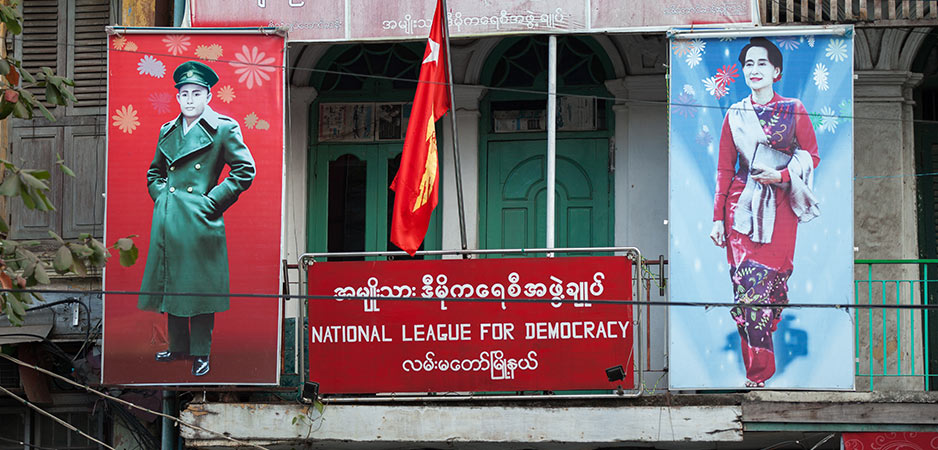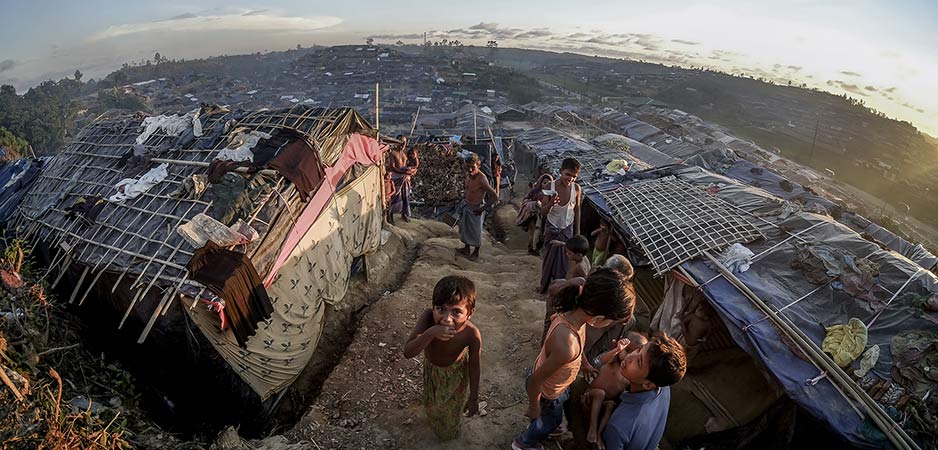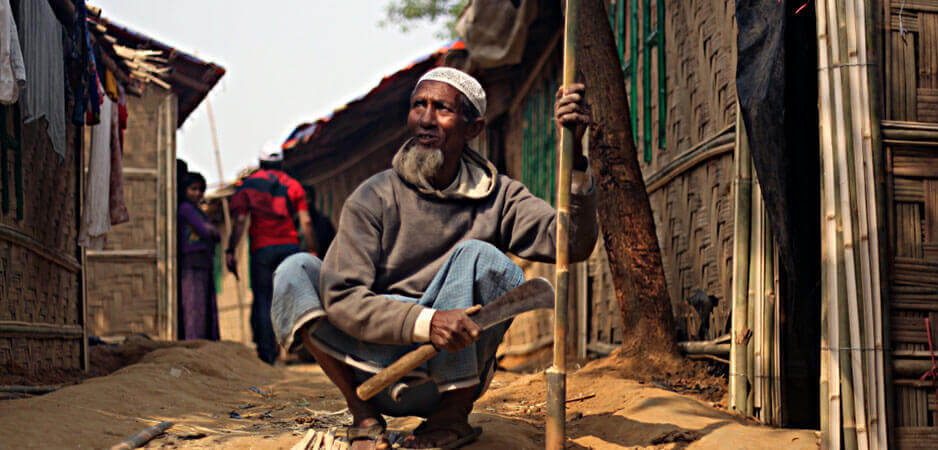On July 2, Myanmar became the only country in India’s immediate neighborhood to accuse China of interference in its internal affairs. Senior General Min Aung Hlaing, the commander-in-chief of the Tatmadaw or the combined armed forces of Myanmar, accused China of arming terrorist groups like the Arakan Army (AA) and Arakan Rohingya Salvation Army (ARSA) in an interview with Russian state-run TV channel Zvezda. He also sought international help to suppress them.
Rohingya Refugee Camps Are the Next Frontline in COVID-19 Fight
Min Aung Hlaing’s statement is telling. It reveals that China is putting unprecedented pressure on its neighbors in the Association of Southeast Asian Nations (ASEAN). It is important to note that Min Aung Hlaing praised China as an “eternal friend” during a visit to Beijing in 2019. He thanked China for its support and for countering international pressure on Myanmar over its treatment of Rohingya civilians, a Muslim minority in Rakhine State.
The senior general has turned on Beijing at a sensitive time. China is facing international criticism for the spread of the COVID-19 disease, its detainment of Uighur Muslims in the Xinjiang region and for its aggression toward its neighbors. Yet it could be seen as part of a longer pattern in Myanmar.
Turning Away from China Not Easy
More than 10 years ago, the then-ruling military junta decided to reduce Myanmar’s economic dependence on China. At the heart of this decision was the goal of reducing China’s excessive influence in Myanmar.
When retired General Thein Sein was president from 2010 to 2015, he ushered in initiatives to repair relations with India, the West and ASEAN. At first, these initiatives led to increased international aid, but it was short-lived due to the military crackdown on the Rohingya insurgency in the Rakhine state. Myanmar has faced international condemnation, isolation and sanctions since. By 2017, the brief “honeymoon” was over and China was back to its old games, with the West losing its window of opportunity in Myanmar.
China has been known to support the United Wa State Army (UWSA). The UWSA is an armed force of an ethnic minority that runs an autonomous region with little interference from central authorities. As per the Asia Times, the “UWSA’s relationship with China is a pillar of its autonomy.” China uses the UWSA to exert leverage within Myanmar. It also benefits economically because minerals from the Wa area are exported across the border to China.
The UWSA is one of the many insurance policies Beijing uses to retain its eminence in Myanmar. Today, it has cultivated the ruling National League for Democracy (NLD) led by Aung San Suu Kyi, a Nobel laureate who was once the darling of the West. She wants to reverse Thein Sein’s decision in 2011 to suspend work on the Myitsone dam. Beijing’s State Power Investment Corporation (SPIC) was supposed to build this $3.6-billion dam at the source of the Irrawaddy River.
The Myitsone area is said to be the birthplace of the Kachin people, after whom the state is named. They have fought the Tatmadaw since 1962, making itis one of the longest civil wars for a resource-rich region. The Kachin oppose the dam because it could put large parts of their region under water and threaten their livelihoods. As the BBC reports, Suu Kyi “needs to establish prosperity and peace if she is to convince the Burmese people of the benefits of democracy.” The dam might provide irrigation and electricity, boosting the ruling NLD.
Suu Kyi is turning to China because the West has abandoned her. The days when former US President Barack Obama visited Myanmar and kissed her cheek seem distant. The Rohingya crisis has been roundly criticized by Western media and brought allegations of genocide.
Chinese President Xi Jinping has stepped into the vacuum and visited Myanmar earlier this year. China has been planning the China–Myanmar Economic Corridor (CEMC) as part of its Belt and Road Initiative. It includes infrastructure such as railways and a deep-sea port at Kyaukphyu on the Bay of Bengal. This port will help China avoid the more vulnerable Straits of Malacca, where it fears being choked off.
The West Must Change Tack with Myanmar
Since 1990, Western powers have imposed sanctions on Myanmar for a variety of reasons ranging from human rights violations to lack of democracy. At the same time, they rushed to engage with China despite the 1989 Tiananmen Massacre. Myanmar became an outcast even as China won investments, joint ventures and a red carpet welcome to the World Trade Organization.
Unlike China, which has had no election for 75 years, Myanmar has held three major elections in 1990, 2010 and 2015. A fourth is due in October this year. Suu Kyi’s NLD has won the past three elections.
When it comes to the treatment of minorities, China has been worse than Myanmar. Its treatment of Tibetans has been terrible and its persecution of Uighurs makes daily headlines. Therefore, Min Aung Hlaing’s revelation that China is championing the Rohingya — a majority of whom are now sheltering in Bangladesh — is deeply ironic. China is supporting the Arakan Army and the Arakan Rohingya Salvation Army to destabilize Myanmar and win their support in the future. This policy of interference in Myanmar has implications for both India and Bangladesh. It is in keeping with the Chinese policy of destabilizing India’s northeast region.
China’s strategy of destabilizing Myanmar even as it makes it an economic vassal has lessons for others. Western powers must provide Myanmar with much-needed investment. The Tatmadaw, led by Senior General Min Aung Hlaing, clearly wants to avoid Chinese domination. Suu Kyi is also no natural ally of China. They have both been pushed into Chinese arms by Western intransigence. Along with investments, a security arrangement involving many countries such as India, Bangladesh and Western powers would help.
Currently, the Quadrilateral Security Dialogue (or the Quad) is the best vehicle to guarantee Myanmar’s security. It must thwart the development of CMEC. Otherwise, the Chinese navy will be sitting on India’s doorstep and the Quad would lose strategic advantage in the Indian Ocean. India has already been strengthening its relationship with Myanmar under its “Look East” or “Act East” policy. The relationship has been on the upswing since 2010 and is set to improve further.
Yangon is sensitive to India’s strategic and security concerns. India has shown the same degree of understanding. For India, Myanmar is the archway to ASEAN and the far east. With the Chinese causing mischief at its borders, Myanmar has increasing strategic importance for India.
The West must join India in its constructive engagement with Myanmar. In the October elections, Aung San Suu Kyi’s NLD is expected to win again. This victory could usher in an era of stability, economic progress and development. Myanmar’s civil and military leadership has no desire to embrace vassal status. It is up to the West to step up and give Myanmar a choice. With the Chinese menace rising by the day, failure to do so would be a historic blunder.
The views expressed in this article are the author’s own and do not necessarily reflect Fair Observer’s editorial policy.
For more than 10 years, Fair Observer has been free, fair and independent. No billionaire owns us, no advertisers control us. We are a reader-supported nonprofit. Unlike many other publications, we keep our content free for readers regardless of where they live or whether they can afford to pay. We have no paywalls and no ads.
In the post-truth era of fake news, echo chambers and filter bubbles, we publish a plurality of perspectives from around the world. Anyone can publish with us, but everyone goes through a rigorous editorial process. So, you get fact-checked, well-reasoned content instead of noise.
We publish 2,500+ voices from 90+ countries. We also conduct education and training programs
on subjects ranging from digital media and journalism to writing and critical thinking. This
doesn’t come cheap. Servers, editors, trainers and web developers cost
money.
Please consider supporting us on a regular basis as a recurring donor or a
sustaining member.
Support Fair Observer
We rely on your support for our independence, diversity and quality.
Will you support FO’s journalism?
We rely on your support for our independence, diversity and quality.






